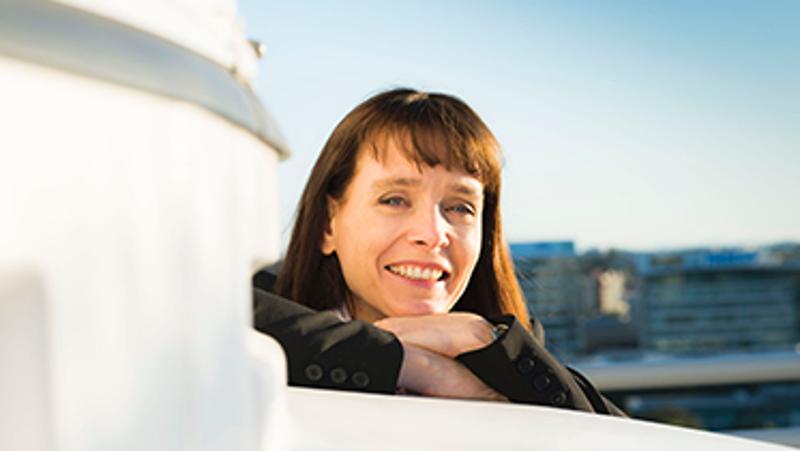
If anyone can answer humanity's most burning question - are we alone? - it's likely Dr Abigail Allwood.
The astrobiologist and co-leader for NASA's Mars 2020 rover mission was today named 2015 QUT Outstanding Alumnus of the Year, after winning the university's Science and Engineering Faculty award.
The next Mars rover robot to visit the red planet will search for signs of past life - and if it finds that evidence, Dr Allwood's machine will play a lead role in that discovery.
Dr Allwood is the mission's principal investigator for her Planetary Instrument for X-ray Lithochemistry (PIXL), one of seven sophisticated scientific instruments that will be packed onto the rover.
Operated remotely by her team back on Earth, it will analyse the chemistry of Martian rocks in finer detail than ever done before.
"We will be able to map rock chemistry at the scale of sand grains, giving us a betterunderstanding of the processes by which the rocks formed," Dr Allwood said.
"This detailed analysis will help us figure out whether the environments the rocks formed in could - or did - support life.
"If there ever was life on Mars, it's likely that it was microbial, because favourable conditions for life were short lived, very early in Martian history.
"That means any life forms would not have had much time, compared to Earth, to evolve into more complex organisms. This is why the Mars 2020 rover mission is concentrating on looking for evidence of ancient microbes rather than something like a dinosaur bone or shell."
The Mars 2020 mission is the culmination of Dr Allwood's life-long dream to explore the Solar System.
Her passion was ignited as a young girl in Rochedale, watching Voyager mission scientist Dr Carolyn Porco describe on television the moment she became the first person to see Voyager's stunning, first-ever close-up images of Saturn.
Dr Allwood first studied physics at QUT as a pathway to space exploration. It was here she discovered her second great love, geology, graduating instead with a first-class honours degree in geoscience.
"I'd never been exposed to geology in high school so I never considered it as a career - but I was soon hooked," Dr Allwood said.
"I knew it would be relevant for studying other rocky planets, especially Mars.
"But as time passed and the reality of having to find a real job gradually sank in, I gave up on planets and headed towards the Western Australian oil industry."
A chance meeting with past NASA scientist Malcolm Walter put Dr Allwood back on the planetary path, studying 3.5 billion-year-old rocks in the Pilbara region to see if features within those rocks constituted evidence of life.
That PhD research led to her appointment to NASA's Jet Propulsion Laboratory (JPL) and underpinned her six-year development of PIXL.
Dr Allwood is critical of the lack of domestic opportunities for Australian science graduates, many of whom leave Australia in search of job opportunities.
"The best source of inspiration for young Australians to pursue STEM careers, would be the promise of a really cool STEM job, here in Australia," Dr Allwood said.
"Especially, I feel like Australia could have much more engagement in space exploration.
"Imagine if we could build instruments for the next Mars rover, or Europa lander, or Venus probe, right here in Australia.
"Australia's limited involvement in space science belies our potential capability and misses perhaps the greatest opportunity to inspire young Australians to pursue science, technology, engineering and maths (STEM) careers."
Dr Allwood's future goals are firmly set on NASA's Mars agenda.
But would she ever volunteer herself for a manned mission to Mars?
"I'd go mad at being stuck in a tin can for eight months each way!" Dr Allwood said.
"I used to want to go when I was young because it seemed so much more amazing than boring old Earth.
"But being an astrobiologist and planetary scientist has given me a different perspective. Earth is a mind-bogglingly complex system of interactions between biosphere-atmosphere-hydrosphere-lithosphere - a delicate, beautiful web that enables life as we know it.
"We have not found anything quite like it in the universe. From that perspective, it is actually Mars that is mundane in the universe, while Earth is indescribably special."
QUT's 2015 Outstanding Alumni Award faculty winners:
Business - Carolyn Dawkins, BrandLab head, Google
Creative Industries - Leigh Sales, ABC 7.30 host, author
Education - Carmee Lim, Jumpstart Kidsports CEO, Aoede Music Enterprise founder
Health - Karni Liddell, Adaption Fitness director, Paralympic swimmer
Law - Dominic McGann, Chairman of Partners at McCullough Roberston, Brisbane Writers Festival chair
Science and Engineering - Dr Abigail Allwood, NASA Mars 2020 rover mission principal investigator
Young Alumnus of the Year winners:
Andrew Blackman (Business) - economic advisor to Government of Ecuador
Andrew Northcott (Science and Engineering) - Labour Solutions Australia CEO, Austpec founder
2015 Special Excellence Award winners:
Andrew Gourley (Business) - Red Frogs Australia founder
Carmee Lim (Education) - Jumpstart Kidsports CEO, Aoede Music Enterprise founder
RELATED STORIES
Australia urged to join sppace exploration: NASA scientist
Media contacts
Kate Haggman, QUT Media, 07 3138 0358, kate.haggman@qut.edu.au
After hours Rose Trapnell, QUT Media team leader, 0407 585 901.


